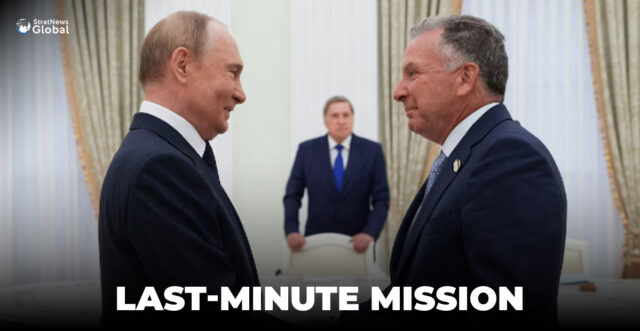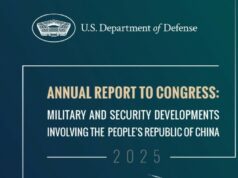U.S. President Donald Trump’s special envoy, Steve Witkoff, met with Russian President Vladimir Putin in Moscow on Wednesday, just days before Trump’s deadline for Russia to agree to a peace deal in Ukraine or face sweeping new sanctions, including penalties that could impact nations purchasing Russian oil.
The Kremlin confirmed the meeting but gave no further details.
Earlier in the day, Witkoff was seen walking through Zaryadye Park near the Kremlin with Kirill Dmitriev, Putin’s envoy for investment and a key figure in recent Russia-Ukraine and Russia-U.S. negotiations.
Those diplomatic efforts, including several rounds of talks in Istanbul, have so far failed to end the war, which began with Russia’s invasion over three years ago.
Trump’s ultimatum expires on Friday, with the White House threatening harsh tariffs and other economic actions if hostilities continue.
Trump has reportedly grown increasingly frustrated with Putin’s intensifying strikes on Ukrainian civilian infrastructure — attacks he views as efforts to break public resistance.
Russia Continuing Strikes
Overnight strikes in southern Ukraine’s Zaporizhzhia region killed two people and injured a dozen more, including children, according to local officials. Ukrainian President Volodymyr Zelenskyy condemned the attack, calling it an act of intimidation with no military value.
Despite repeated urging from Trump to de-escalate, Russia has pressed on with a slow but steady military campaign aimed at expanding its territorial control.
Western analysts believe Putin is deliberately delaying meaningful negotiations while his forces make incremental gains on the battlefield.
The frontline remains precarious for Ukraine, but experts say a complete collapse of Ukrainian defences is not imminent.
Trump, speaking Tuesday, remained noncommittal about the scope of potential sanctions, especially regarding tariffs on countries like China and India that continue buying Russian oil. “We’ll see what happens,” he said, referring to the scheduled meeting with Russian officials.
Any dramatic escalation in U.S. economic pressure could further strain already tense U.S.-Russia relations. A recent assessment by the Centre for European Policy Analysis warned that Moscow may be preparing for broader conflict with NATO, citing its military buildup near alliance borders.
Meanwhile, Putin has shown no signs of yielding to international pressure. Instead, he has emphasised Russia’s growing military capabilities, including the induction of a new hypersonic missile system he claims can evade NATO defences.
Nuclear Tensions
Former Russian President Dmitry Medvedev even suggested that the Ukraine conflict could spiral into direct U.S.-Russia confrontation. In response, Trump ordered the repositioning of two American nuclear submarines.
Kremlin spokesperson Dmitry Peskov welcomed Witkoff’s visit, calling the talks “important and substantive.” Trump originally gave Moscow a 50-day window to halt its aggression, later shortening the deadline as civilian casualties mounted.
Still, Trump has acknowledged the limits of sanctions, recently remarking that Russia has proven adept at evading them: “They’re wily characters,” he said.
While Moscow downplays the impact of international sanctions, Ukraine continues to insist they are working — and calls on its Western allies to intensify pressure on the Kremlin’s war machine.
(With inputs from IBNS)





